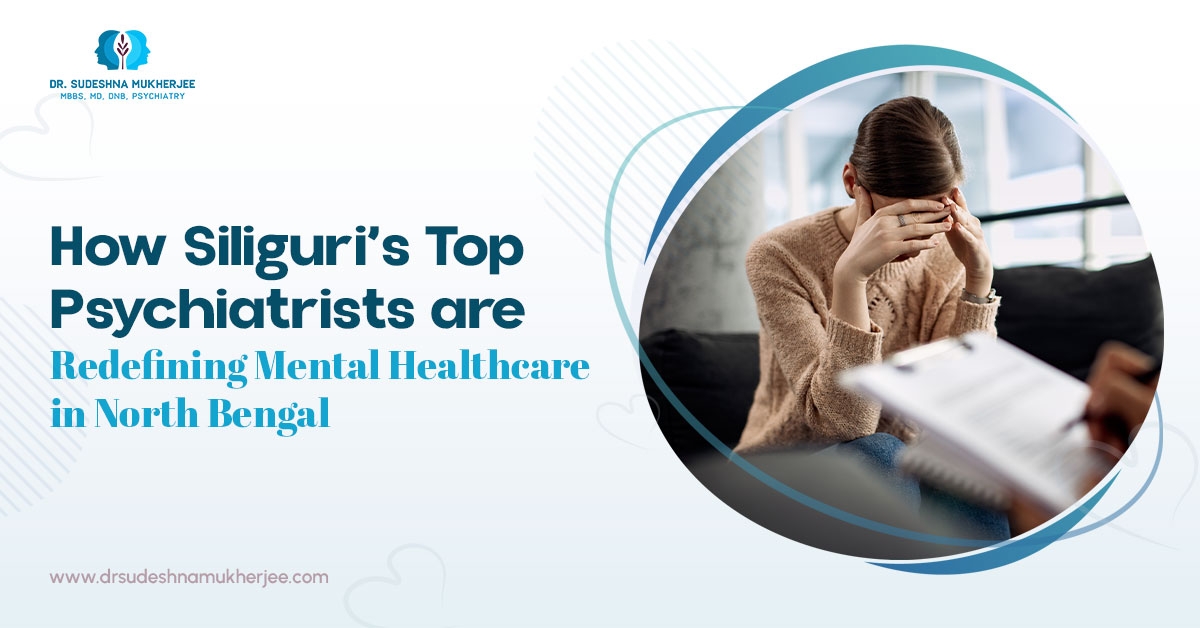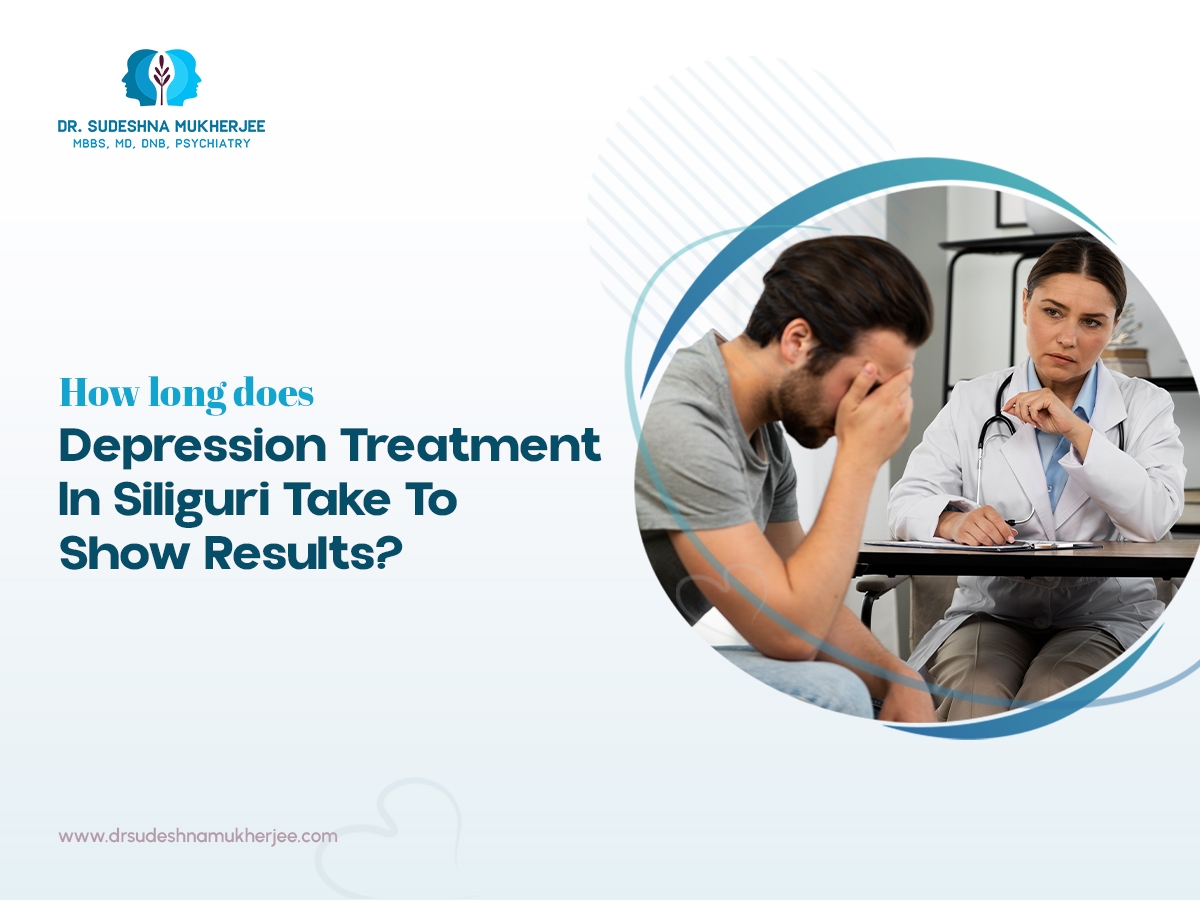Depression is a long-term mood disorder that can affect people at any age. Personalized care and precise diagnosis can treat depression symptoms and benefit patients' quality of life. However, the struggle for many is asking for psychiatric support.
Many people still misinterpret depression, and myths about the condition exist. It’s always advisable to consult a reliable mental health professional for depression care and management. For trusted depression treatment in Siliguri City, you may see the leading psychiatrist here.
Typical Signs and Symptoms of Depression
A variety of depression symptoms are there; however, they may vary from person to person. The following are the typical symptoms of depressive disorder:
Ongoing low mood, empty, or gloomy feelings
- A feeling of irritation, frustration, or angry outbursts
- Low appetite, social withdrawal, hopelessness, or tearfulness
- Loss of pleasure or interest in the majority of day-to-day activities, including hobbies, and sex
- Personality changes in older adults
- Memory difficulties in older adults
- Persistent feelings of misunderstood
- Slower speech and thought process
- Poor attendance at school and poor performance in academics
- Sleep disorders, such as excessive sleeping or insomnia
- Lack of energy and fatigue
- Weight loss
- Increased food desires
- Restlessness, agitation, or anxiety
- Difficulty focusing, thinking, and making decisions
- Physical issues that cannot be explained, including headaches, abdominal pain, or back pain
- Feelings of shame or unworthiness, obsessing over previous mistakes, or self-blame
- Suicidal thoughts, self-harm in any form, or ongoing thoughts of death, especially in older adults and adults.
Knowing about the Myths and Facts of Depressive Disorder
This blog shares insights into 13 widespread misconceptions about depression and reveals the reality of each one. Understanding these stereotypes may bring clarity, lessen stigma, and increase empathy, regardless of whether you or someone you care about is experiencing depression.
Myth 1: Depression is Just Sadness
Fact: Let’s understand the facts. Yes, this condition is responsible for a low mood, but it encompasses more than just sadness, which needs expert attention and support.
Depression includes a wide variety of emotional, physical, and cognitive symptoms, such as exhaustion, despair, trouble focusing, lack of interest in activities, sleep difficulties, hopelessness, loneliness, and even physical pain. Among all these signs, sadness or low mood is a major symptom of clinical depression.
Myth 2: Depression is a Sign of Weakness
Fact: Having depression does not indicate weakness, and it can affect anyone. Regardless of one's strength or resilience, depression may strike anyone, affecting the quality of day-to-day life.
Some personality traits in people, including low self-esteem, being pessimistic, being self-critical, and being dependent, may elevate the risk of depression. People with chronic or long-term conditions, like cardiovascular disease, cancer, multiple surgeries, major surgery that takes time to recover, diabetes, and arthritis.
Myth 3: It's Easy to Get Over It
Fact: It's a complex mental disorder, and telling someone to "snap out of it" is not a solution at all. One must know that being depressed is neither a decision nor an indication of weakness.
It includes psychological factors, brain chemical imbalances, exposure to traumatic experiences, et al. Recovery frequently takes time, support, and skilled treatment from a psychiatrist —not just determination.
Myth 4: Only Tragic Events or Trauma Can Cause Depression
Fact: Yes, when these two are common reasons for depressive disorder, there are other reasons for depression besides life experiences. These include long-term stress, hormone imbalances, chronic disease, brain chemistry, personality traits, and genetics can all play a role.
Myth 5: You're Not Depressed if You're Functioning
Fact: People who may have symptoms comparable to those of severe depression but are nonetheless able to fulfill their responsibilities are said to have high-functioning depression.
It doesn't follow that someone isn't in pain on the inside just because they get out of bed, go to work, or continue to be social. Avail of medical support for depression treatment from a reliable doctor in the location.
Myth 6: Taking Antidepressants for Depression is Harmful
Fact: Taking medicine for depression is important when a patient needs to manage symptoms and support recovery. Psychiatrists prescribe antidepressants or any medications based on clinical diagnosis.
In fact, medications like antidepressants are frequently an essential aspect of depression treatment. Much like taking insulin for diabetes (when needed), antidepressants for depression symptoms are important. Many patients find that antidepressants can save their lives by treating chemical imbalances in the brain. Here, medical care plans vary from person to person with depression. Therefore, taking prescription medicine is important.
Myth 7: Talking About Depression Makes It Worse
Fact: To promote recovery and lessen stigma, candid discussions about depression are necessary. Talking about depression, when done with compassion and empathy, may help people struggling with it feel better emotionally.
Also, it helps them get the support they require. If symptoms like ongoing negative thoughts, persistent low mood, a sense of loneliness and hopelessness, or a lack of pleasure in activities are there, consulting a doctor is a must.
Myth 8: Depression Is Part of Aging
Fact: The reality is that aging might affect mood, but not necessarily for every older adult. Due to health issues and life transitions, older persons may be more susceptible to depression or anxiety disorders. However, depressive disorder is not a typical part of growing older, as per evidence.
Seeing a medical expert, like a general physician or psychiatrist, is vital if symptoms like persistent low mood, lack of pleasure or interest in activities, and negative thought patterns are present.
Myth 9: Depression Only Affects Women
Fact:People of all genders can be impacted by depressive disorder. However, men are frequently discouraged from admitting their vulnerability due to cultural expectations. In many cases, depression goes undiagnosed and unreported for this reason.
The fact that women's hormonal fluctuations, especially throughout adolescence, before menstruation, the menopausal journey, and social experiences, are associated with a higher prevalence of depression in women. Although depression is twice as common among women, it may also strike men.
Myth 10: People with Depression Used to Cry a Lot
Fact: The effects or signs of depression often vary. Some people who are depressed don't cry. They could instead come across as emotionally "blank" and feel unworthy, lonely, hopeless, or unhelpful. Depression limits a person's ability to fully enjoy life, affecting their relationships, social life, self-care, etc.
Symptoms of depression affect the quality of life; hence, medical attention is essential for optimal recovery and long-term management. You might visit one of the leading psychiatrists, Dr. Sudeshna Mukherjee, for depression treatment in the region.
Myth 11: Depression Is Tough to Treat
Fact: One of the most curable mental illnesses is depression, and with a patient-centric approach, doctors help patients overcome and manage depression effectively.
Yes, depression is a complicated mood disorder, but between 80% and 90% of people who have been diagnosed with major depressive disorder receive positive outcomes from medical treatment.
Myth 12: If Depression Runs in Your Family, It Will Affect You Too
Fact: A family history of depression, especially in first-degree relatives, may increase your risk for the same, although it’s not a given. Did you know that about half of the causes of depression are hereditary, while the other half are unrelated to genes?
Particularly, depression is prevalent in those who are dealing with long-term stressful situations, such as socioeconomic deprivation and difficult relationships. Consulting a doctor for depression problem can be of great help.
Myth 13: Once You’re Treated, Depression Is Gone Permanently
Fact: Relapses can occur in any disease or disorder, and clinical depression needs long-term management. That only indicates that routine care is crucial. This is not because the medicine isn't working.
Similar to other chronic conditions, depression management may call for sustained support, lifestyle modifications, and long-term tactics. Pay attention to what your psychiatrist has to say about regular care routines and lifestyle changes.
Myths about depression not only keep people from getting treatment but also encourage stigma, confusion, fear, and misinformation. There is assistance available always if you or someone you know is experiencing depression.
Changes in lifestyle, therapy, medication, and a supportive environment are key to healing your mood. Talk to one of the best doctors for depression in Siliguri City for successful management and recovery.




